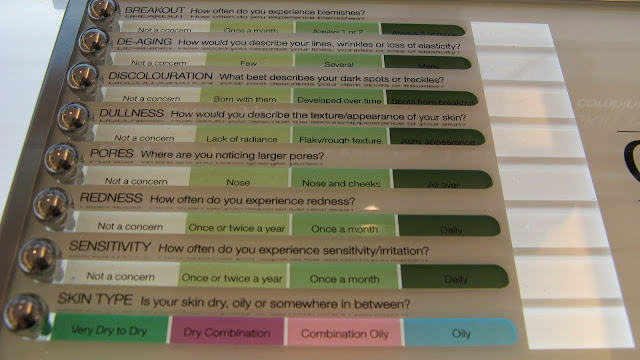For most skin care companies, "problem-free" skin doesn't exist. Above is Clinique's Skin Type abacus where women can determine whether their skin better resembles a grease slick or a a set of flaky fish scales or -- if you're really lucky -- a combination of the two.
I remember poring over this in-store questionnaire at 14, wondering how my face failed to fit into any of these categories. Instead of feeling proud that I wasn't dry, oily or some combination of the two, I worried that there must be something wrong with me for not having skin that could be cured by any number of the multi-colored bottles at the cosmetics counter. Because surely all skin needed curing. So, because I was very pale, I convinced myself that I had sensitive skin -- surely there was a grey cloud in that silver lining if I could just find it. I used any number of hypo-allergenic, gentle, alcohol-free products that likely did nothing for me (though, to be fair, didn't hurt, either).
This is definitely the epitome of first-world problems, but I'm not trying to say that it was tragic that a 14-year-old me didn't have acne or eczema. Instead, I think it highlights something important about the cosmetics industry that, while obvious, needs constant reminding: it is ultimately a business predicated on convincing you that there has to be something wrong that you need to fix; you can't just need to wash when you're dirty and put lotion on when it's a bit drier out. No, at any given moment your face might sabotage your hopes and dreams -- hopes and dreams like boys, dates, parties where boys might be and school: where the boys are.
Then, as you age, you might think you're out of the woods (particularly if you've gotten married to one of the many boys you had hoped to snare with your anti-acne creams). But no -- now your skin is on a terrifyintg death spiral and the only way to keep it from looking like a giant wrinkly elephant ear, which will in turn lead to divorce and unhappiness, is to slather it with new (and more expensive) creams.
Much as I like skin care (and I do), keep in mind that most people can't see your black heads or the slight shadow below your eyes. Ultimately, your skin reflects your genetics, your geographical climate and what you've been eating and drinking for the last few years. Skin care is, at best, a polish that will give you a slightly better complexion but cannot undo hours at a tanning salon and -- for financial reasons -- has not been created to solve your problems completely. After all, skin care companies don't want you to think you could survive without their 5-piece regime.
Have fun with skin care; treat it as another cosmetic or beauty tool, but don't be tricked into thinking that it's a problem. Every image you see of celebrities — unless they’re caught walking to their car in broad daylight with no makeup on — has been manipulated in some way. Perfect, even, pore-free, flaw-free skin does not exist and no cream in the world will give it to you. So how can your skin possibly be imperfect if the alternative isn't even real?

Big Kudos for this post! While I feel that skin care is important, it definitely helps to take everything the cosmetics industry asserts with a grain of salt. If more cosmetics companies gave the straight dope and emphasized keeping your skin (no matter what type) healthy, rather than trying to feed you a bunch of bullshit, I would be a much happier and confident consumer. As it is, I would rather not purchase from a company that treats me like an idiot. 'HEY YOU'VE GOT LOTS OF PROBLEMS YOU MIGHT NOT EVEN HAVE NOTICED, LET US FIX THEM MAGICALLY AND GIVE US ALL YOUR MONIES.'
ReplyDeleteuhh no thanks.
Thanks! That's basically it, in my opinion. I don't need to be told that I can erase wrinkles or clear up acne, but I'd love to find a product that'll make my skin look more hydrated/dewy, which is possible.
Delete